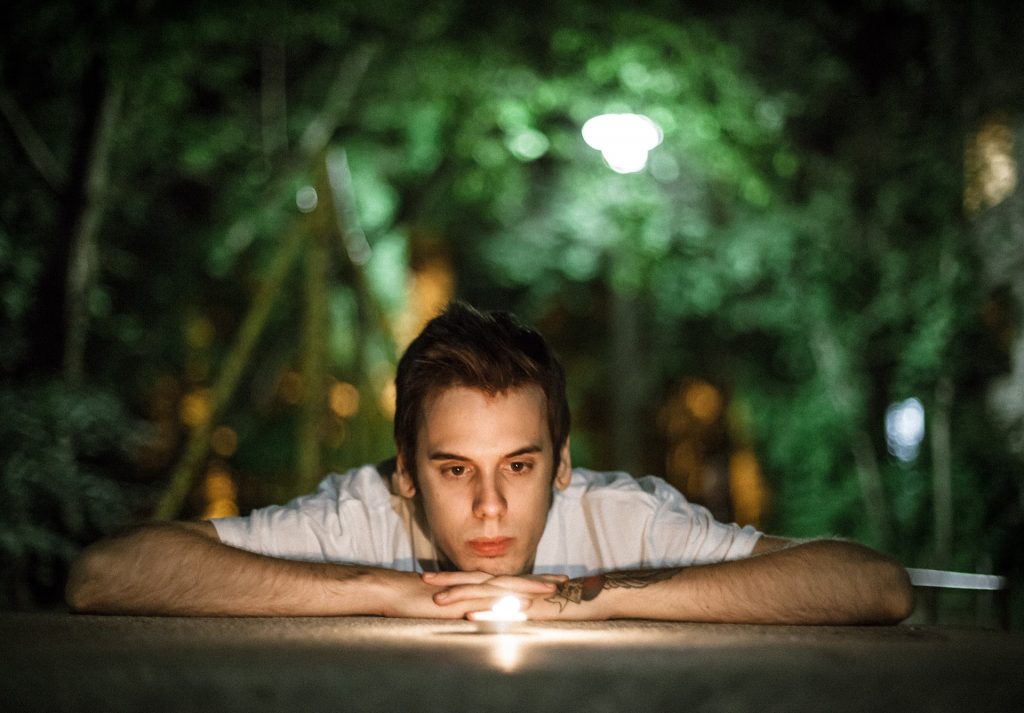10 Thoughts After Co-Worker Suicide: A Fire Fighter’s Personal Account – Matt Johnston

My name is Matt Johnston and I am a mental health clinician and professional fire fighter from Vancouver, British Columbia. In the past decade, I have worked in a clinical capacity with many clients that had a history of self-harm and suicide attempts. I am fortunate to say that no active caseload client has completed suicide while under my care and guidance.
In 2012, I became a full-time municipal fire fighter in a large Canadian city and wondered how my two careers would mesh in the coming years. Over a 20-month period, I had two coworkers die by suicide and two other coworkers die by motor vehicle accidents. 1% of my membership left the other 99% in a complex state of workplace shock.
Why has suicide become a nearly daily occurrence among first responders in North America? First responders – police, fire fighters, paramedics and corrections staff seemed invincible to me as a child. Perhaps this is what it is; the bravado prevents individuals- primarily males, from reaching out for support before they lose all hope with living. By too late, I mean that the first responder may believe that suicide is the only way to stop their perception of unfixable suffering. Given that many first responders may be desensitized to the concept of death as a result of regular trauma exposure, suicides rates among first responders continue to reach unprecedented levels.
As a first responder, I expect to come to work to deal with the shock and distress of civilians. My training as a mental health clinician served me well in being comfortable with human suffering. “I didn’t create this, I tried to help”– common thoughts that served me well as a clinician that I had successfully applied to fire fighting. Of the nearly 2000 calls I have attended as a fire fighter, I must admit that I don’t recall the vast majority of them, even if they involved death. Dismemberment tends to stick with me a bit more, but besides the odd weird dream, I can’t say that any call has stung me beyond a couple of weeks.

Co-worker suicide is an entirely different experience that sticks with me daily.
If the intention of the departed was to leave a mark on the world, they certainly did so by leaving the world behind wondering what went wrong. Every suicide casts a ripple that affects countless individuals around them.
To the departed, I often wonder if they would be shocked to know how big a whole was created in the hearts of those left behind – even the people who only casually knew them. While each suicide may be unique in circumstance, the common thread is that the suicide of a co-worker is often accompanied by some very difficult, perhaps even troubling thoughts and feelings among others in the tight-knit first responder community.

In my early training as a counsellor, I learned about the concept of gestalt – that the whole is greater than the sum of its’ parts.
A cake is born out of mixing eggs, flour, milk and a few other simple ingredients. Once baked, a cake takes on a distinct, more complex form that can never be separated into its’ individual parts. When a colleague commits suicide, your work gestalt becomes more complex than your individual sense of grief and loss.
To say that my workplace grief was and remains complex is an understatement of epic proportions. For me, I am no longer sure if the grief is my own or those of my 400-member department.
Probably a scrambled combination of both, that like a cake, can never be separated and reduced to a purely individual level. This is the nature of complex work-related grief.
Over the past 2 years, I had many thoughts that I have struggled with, which has made me feel abnormal at times. I have confidence sharing my thoughts because I know that through my training and experience, my thoughts may be unique, but not out of the ordinary. In fact, I consider them normal reactions to a very abnormal workplace phenomenon.
My top 10 thoughts that have stuck with me since the deaths of my four colleagues in the fire service.
1. ”What happened?”
When my colleagues committed suicide just seven weeks apart, the first thought I was drawn to on both occasions is “what happened?” This reaction was an initial symptom of my shock as my mind was consumed by the visual aspect of the act. It is as if I reverted to childhood where I could not believe something had disappeared until I had confirmation through firsthand visual evidence. What I envision is not pleasant, perhaps even grotesque, but it doesn’t haunt me or perforate my thoughts on a daily basis. The visual aspect of what happened causally enters my mind and leaves nonchalantly. This visual has continued to lose its’ impact over the past two years, but I know glimpses of the suicidal acts will continue to be there at seemingly unpredictable times throughout my life.
2. “Why didn’t I see this coming?”
If I was to look back, there were obvious warning signs leading up to the suicides of both colleagues. I remember one of the member’s teary eyed and telling me about his worst calls in front of close to 10 others in the firehall one morning. I didn’t ask him about these stories; they were always on the forefront of his mind and this morning he seemed set on telling me in front of the group. He announced, “if it wasn’t for my son, I wouldn’t be here”. I left the firehall that morning feeling somewhat confused and uneasy, but happy to know he was accessing mental health support. Despite the unordinary nature of the conversation, I remember thinking “He has hope and meaning in his life”. Three weeks later, he died of a self-inflicted wound.
3. “Will I kill myself someday?”
Committing suicide had never crossed my mind prior to age 37. It wasn’t until a respected psychologist spoke to a working group I was part of who said that most adults think of suicide at some point in their lives. Luckily the concept of suicide tends to be a transient thought and the vast majority of people do not follow through on establishing and acting on a plan. Nevertheless, when the suicides occurred in my fire service, a cascade of thoughts entered my mind where I could not help to examine my past trauma and uncomfortable memories.
4. “Is suicide contagious?”
It is sad, but I believe from first hand evidence that suicide in a first responder workplace has a contagious element. Living together on the job and witnessing traumatic incidents on a regular basis creates a unique bond that few outsiders could understand. When that bond is broken through the intentional death of a co-worker a major part of coping with trauma through a sense of togetherness is torn. This severed connection is made worse by the desensitization that comes along with witnessing death and dying on a weekly basis. It seems common to me that many fire fighters are not as afraid of death as the general population. This is the main reason why I think suicide is contagious among fire fighters.
5. “If the thought of suicide has crossed my mind, does this make me crazy?”
Shortly after the second suicide at my work, I was riding my bike across a newer large bridge and noticed there were suicide helplines lines every 100 metres. I couldn’t help but to notice that the only thing separating me and the river far below was a 5-foot high railing. The thought of how easy it would be to jump off the bridge scared me and sent chills down my spine. For the first time, the suicide of someone I knew had somehow planted a thought within me that changed my worldview.
Instead of marveling in the architectural feat of the builders, my mind became consumed with how the bridge could be looked upon as a way to end my own life. I remain comforted by how scary that thought was at the time and the impact it remains to have with me today.
6. “Why aren’t my colleagues making this a bigger deal?”
At first, it bothered me that my colleagues were not talking much about the suicides or deaths of co-workers. At times I felt that the deaths seemed to never even happen. Grief counselling services were held and only a handful of members showed up across multiple days. At first I was saddened by the lack of interest in sharing one’s experience, but at least the effort still gave members a sense of psychological support. While people have a variety of personal reasons for not discussing the suicide of a colleague, it was important for me to keep in mind that this may not be for a lack of caring or minimizing the memory of the deceased. The first responder workplace is simply not a safe context for discussing topics surrounding co-worker death and suicide.
7. “I am restless, sleep is my enemy, when will I feel better?”
I have realized that workplace grief is a complex, individualized process that is dependent on my personal life and how well rested I am. I have realized that my personal perception of loss changes over time, but my brain will not forget about the incidents. If I am restless, I need to work out and put an emphasis on cardiovascular activity. If I let the stress get to me, even my sweat smells differently, probably because of the stress hormones that flow through my body as a product of this occupation and the sleep deprivation that accompanies shift work. Running has been my form of meditation and recovery, where I can flush my system and tire my body and mind into sleeping.
8.“Why doesn’t this bother me more?” to “How could they do this?”
I have realized how complex the stages of grief can be. At times, I have felt completely unaffected by my co-workers’ deaths. “I didn’t know them that well”, “this would have happened regardless of me” are a couple of the thoughts that have crossed my mind at seemingly random moments. I consider these thoughts as important ways to cope in a large organization that is going to experience loss on a regular and unpredictable basis. However, leaving a family behind and a group of people who cared has made me angry at times. I remain bewildered by this confusing range of emotions.
9. “Why is it so hard for me to reach out for help?”
If you are like me, you will not reach out for help until you are in a personal crisis that on the surface, seems unrelated to your job. Even with 20 years of training in psychology, I remain resistant to reaching out for help and I think I am the best therapist for myself. Running and social support has been my therapy and seems to continue to work for me. While no one is a poster child for pure emotional health and well-being, my hope is that everyone who does not reach out for help can at least learn how to become their own therapist.
10. “How do I know I am going to be okay in this profession?”
The short answer is I don’t know for certain. It is going to depend on what happens in my personal life and the severity of traumatic calls I attend to at work. I do know from early adolescence onwards that if I maximize the things that keep me happy and healthy, the chances of me experiencing a serious mental health issue in the future is much less likely.
Other Notes about the Article:
On the surface, a seasoned first responder rarely experiences a consciously shocking event because they have become desensitized to dealing with emergency situations. This coping mechanism serves first responders well for work-related events that are impersonal and somewhat anonymous. However, when something truly unexpected happens such as the suicide of a colleague, this loss may strike us at a much deeper personal level. A co-worker death by suicide has the potential to scatter one’s sense of world and blurs our psychological line between work and life.
In sharing these common, perhaps simplified list of self-talk statements, my hope is to provide you some reassurance that what you are thinking is usually quite normal, even if it seems troubling.
You can reach me at my Facebook Page: HERE





Responses